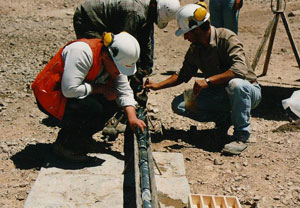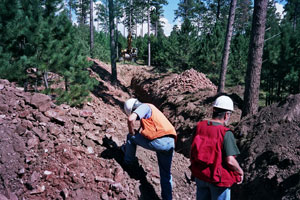Geologist
Tasks & duties

Geologists may do some or all of the following:
-
investigate the internal structure of the Earth
-
study earth processes such as the formation of soils, rocks and faults
-
use geological research to locate oil, natural gas, water and minerals
-
organise drilling and exploration programmes on mine sites
-
collect, examine and analyse rocks, minerals and fossils
-
survey land and seabeds to help prepare geological maps
-
monitor the geotechnical conditions of mine sites
-
draw maps using specialist computer software
-
give advice on land use and resource management
-
advise on risks from landslides, volcanoes, earthquakes and other natural hazards
-
write research papers and reports on the results of their studies
-
write reports on mineral extraction, land use or resource management
-
present papers at conferences
-
review other scientists' work
-
teach at universities
Specialisations
Because geology covers a vast range of subjects, many geologists go on to specialise in the following fields:
-
engineering
-
mining
-
volcanology
-
marine geology
Skills & knowledge

Geologists need to have:
-
knowledge of the processes that shape the Earth, and the formation of rocks and fossils
-
the ability to identify and analyse geological samples and materials
-
research skills
-
skill in analysing and interpreting research results and other information
-
practical skills for performing experiments and operating scientific equipment
-
problem-solving skills
-
planning and organisational skills
-
communication skills
-
writing skills, for writing reports and for publications
-
maths and computer skills
Geologists working in the mining industry need to know how a mine operates, how to extract the desired rock or mineral, and how to manage a drilling programme. They must also be aware of the impact mining has on the environment.
Entry requirements
To become a geologist you need a Bachelor of Science in geology. However, a Masters or Doctorate in geology or engineering geology is preferred.
Secondary education
A tertiary entrance qualification is required to enter tertiary training. Useful subjects include maths with calculus and/or statistics, physics, chemistry, biology, geography and English.
Tertiary education
All the main universities in New Zealand have geology departments.
Training on the job
Some skills are gained on the job. Mine geologists learn the practical aspects of how a mine site operates while they are on the job.
Geologists may attend courses and conferences to keep their skills up to date.
Useful experience
Work on a construction site, in the civil engineering field or a background in mining may be useful experience. Tramping and climbing experience can also be useful in many disciplines of geology. For geologists who want to work in underground mining, any underground work experience is useful.
Related courses
Geology
For more information, please refer to Career Services.
Document Actions
